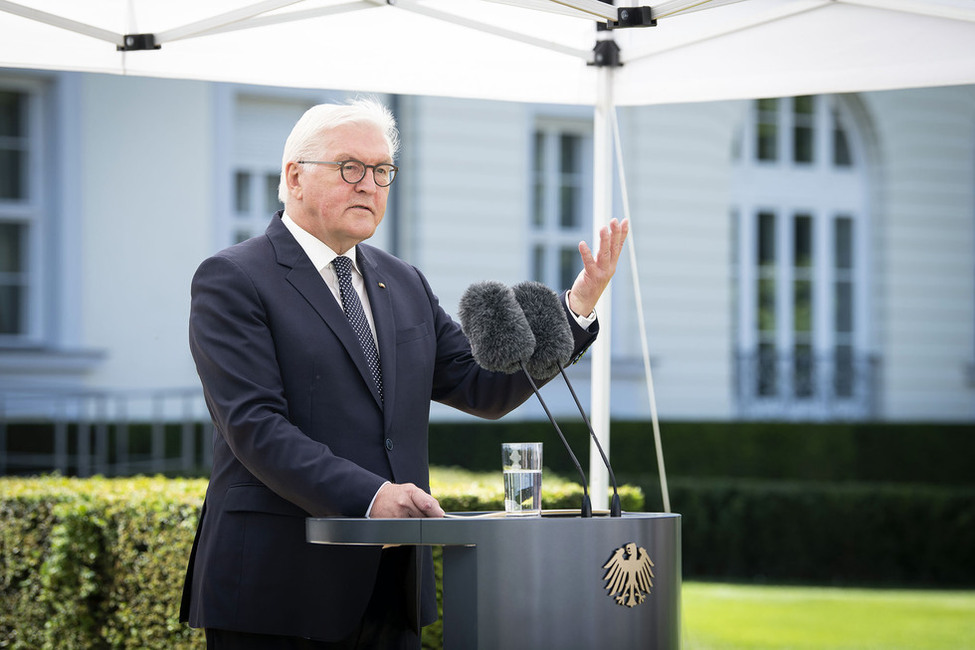Translation of advance text.
Let me bid you all a very warm welcome to Schloss Bellevue – distinguished Humboldtians, dear family members and children!
Everything is interaction.
Everything is interaction
is what Alexander von Humboldt noted down in Mexico, deeply impressed by what he had observed and experienced during his Latin America expedition. It had taken him through the mangroves and jungles of Colombia, to the indigenous tribes and colonial rulers of the Andes mountains, to Cuba and via the volcanoes of Ecuador almost up to the Chimborazo summit, which at the time was considered the highest mountain on earth, and, finally, through Lima into the heart of New Spain, or Mexico.
Everything is interaction.
This simple, yet elegant observation sums up the entire worldview of Alexander von Humboldt – namely, that nothing in nature is fully independent. All people are inextricably linked to their environment. Every deed, even the smallest change, has follow-on effects, never mind the culture or natural environment. He drew this conclusion based on thousands of individual observations, which in turn formed the basis of what at the time was a revolutionary discovery.
These findings are today considered general knowledge – so much so that we are almost surprised to hear how new they were at the time. All of Ecuador’s volcanoes must be interconnected. The various zones of vegetation of the Chimborazo are similar to those of the European Alps, thousands of miles away. Changes in the climate near Lake Valencia in Venezuela destroy vital resources for humans and animals. Humboldt discovered connections where others had merely seen inexplicable natural spectacles or unchallenged human behaviour.
Alexander von Humboldt is therefore rightly considered the father of ecology – or, as Andrea Wulf writes, the inventor of nature
. This year, we celebrate the 250th birthday of this remarkable man. I had the great privilege earlier this year to retrace his footsteps, in Cartagena and Bogotá, in Quito and Guayaquil – as well as here in Berlin, at the Singakademie, the present-day Maxim Gorki Theatre, where he gave his famous Kosmos lectures.
By taking a close look at his life, I refreshed much of my knowledge about a man who for decades has been a role model for me. His restlessness and yearning for knowledge, his cosmopolitan worldview and humanism, the enthusiasm with which he writes about nature and people, drawing new connections between his various findings and the people that he met – all this made Alexander von Humboldt who he was.
That is why I cannot think of a better person to have lent his name to the cause that all of you are part of, dear guests! Everything is interaction
most aptly describes science itself. The concept of an organisation dedicated to promoting international exchange among the very best researchers in various scientific disciplines is something that Alexander von Humboldt would certainly have approved of. Already during his lifetime, he was at the centre of the first global republic of scholars, which had come about thanks to countless letters that he exchanged with the greatest minds of his day.
You all know that scientific excellence feeds on exchange, and on competition between the world’s best. And all of you in the Humboldt family, whether you are currently in the programme or alumni, are making an important contribution in this regard. As Federal President, I would like to add that you are truly helping build Germany’s scientific networks with the entire world, with all of your home countries – and thereby also rendering a great service to this country. You have my heartfelt gratitude for this.
Everything is interaction
is something that we today are becoming ever more conscious of. Here in Germany, we are struggling to cope with a second extremely hot summer and the very real impact it is having on our environment, people and economy. When the Rhine River becomes unnavigable for ships, half the country more or less stands still. Of course, weather trends are not necessarily climate trends. But nobody can deny that there are long-term effects.
For years, science has been calling for action. Starting a few months ago, young people have taken to the streets to do the same. They are saying: we have our whole lives before us – and we expect you to pass on this Earth to us and to all those who come after you in a state worth living on it!
This call is, of course, primarily directed at politicians and governments. But let us not be too easy on ourselves. If we want our children to have a future in this world, we need to do a great deal more. We need to change our rules, our economies, our technologies and – yes, even our own behaviour.
A few months ago, at one of the 250th anniversary celebrations, someone asked me, don’t we need an Alexander von Humboldt today?
That’s an enticing thought. We could use someone to give us a pep talk, no holds barred. Someone who can get information across in a way that, although he is a top researcher, comes across as an international superstar and a best-selling author. Someone who coins simple yet powerful phrases – everything is interaction
, for example.
But, thinking about it, has he ever really left us? Because, today, hundreds, thousands, and even tens of thousands who have come after him are continuing his work – whether it be in the natural or cultural sciences, in the humanities, or as engineers. Quite a few of those people are here today, in Schlosspark Bellevue. You have brought your families, and we are pleased to host you here as friends.
Yes, Humboldt is here among us. His ambition, his spirit and his curiosity are embodied by you.
Allow me to warmly welcome you once again. I look forward to talking to you!


